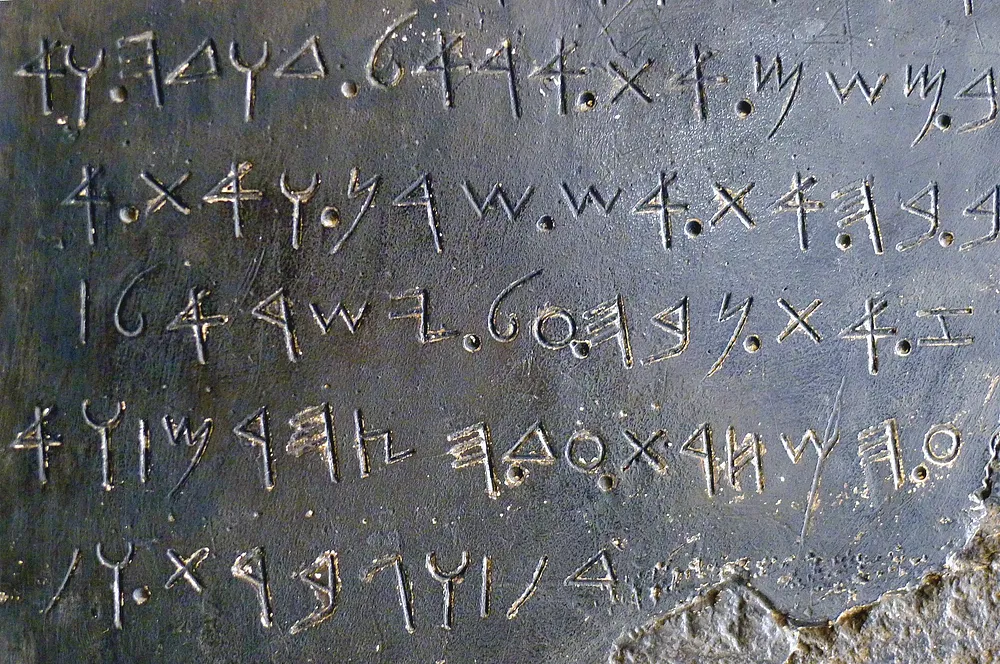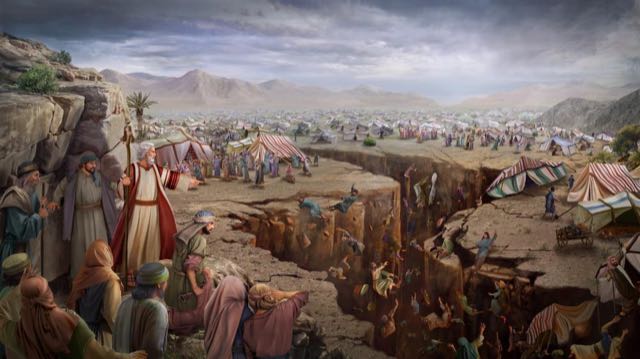Only Jesus is enough because he is the only one that God the Father has sent. Christ is sufficient to reveal the Father to us. As the one sent from the Father, he is true spiritual food. He always does the Father’s will – and it is the Father’s will that everyone who believe in him be raised on the last day. It is God alone who accomplishes this. It is not an act of our own strength. The Father’s drawing is always effective to save those for whom it is intended. Jesus is sufficient because he does his Father’s will perfectly.
Jesus does the Father’s will perfectly in the incarnation. In this passage, it is important to take careful notice of what the crowd believes is true of Jesus. The crowd that Jesus was preaching to did not have an issue with necessity of Christ, but the sufficiency of Christ. After Jesus performed the miracle of the feeding of the five thousand, the crowd responded by trying to make Jesus king by force. These people clearly understood that Jesus was the king. They even called him “the Prophet who is to come into the world!” The crowd is so persistent that Jesus flees the crowd into the mountains by himself, and once it becomes dark he uses his ability to walk on water to regroup with the disciples. But that doesn’t dissuade these followers of Christ. The crowd notices that Jesus is mysteriously gone and they follow him all the way across the lake in what is probably stormy waters. These were not a group of random pagans. The crowd was a group of people who believe that Jesus was king, that he’s the prophet they were looking for, and that he was powerful enough to do miracles.
The problem, however, was that these people’s faith was not a genuine faith. In verse 26-27 Jesus tells them “. . . you are seeking me, not because you saw signs, but because you ate your fill of the loaves.” They just wanted to have their bellies filled. Rather than focusing on the Messiah himself, they were focused on all the blessings that the Messiah had to offer. They were working for the wrong food.
They thought that eternal life came through Jesus and adherence to God’s commandments. But eternal life comes through Christ alone. While God’s commandments are important, they aren’t the source of eternal life. Rather, “It is the Spirit who gives life” and true food – true justification and peace with God – doesn’t come from Moses but from the Father. These particular Jews understood that Christ was necessary, but they just didn’t understand that he was sufficient. And the reason that they didn’t understand Jesus sufficiency is because they didn’t recognize that Jesus was sent by the Father.
When Jesus claims to have seen the Father the Jews began to grumble. And if Jesus was not God, then it’s sort of understandable why they got upset about this. In Isaiah chapter 6, the prophet Isaiah is transported to the throne room of God where he sees mighty seraphim covering their faces crying out day and night. And when Isaiah sees just this small glimpse of God’s glory he is struck with despair and cries out “Woe is me! For I am lost; for I am a man of unclean lips, and I dwell in the midst of a people of unclean lips; for my eyes have seen the King, the LORD of hosts!” So it is understandable why they where a little skeptical when this carpenter guy from Nazareth claims that he has seen the Father.
But if he has seen the Father, then there is an exclusivity there. He’s unique in that way. He is the only one who has seen him. And, since he alone has seen the Father, only he can reveal the Father to us. We get this same sort of idea back in John chapter 1 when he says “No one has ever seen God; the only God, who is at the Father’s side, he has made him known.”
God the Son humbled himself, not by depriving himself of his divinity but by taking on humanity. Think about how marvelous it is that the holy, good, and just God of the entire universe would not only reveal himself, but take on a created human nature to do so. The simple fact that Jesus came down from heaven should blow us away. Though the crowd understood that Christ was necessary they failed to recognize that he was sufficient. As a result, they were offended when Christ said that he was sent by the Father. We can only have a relationship with the Father through Christ. The God-man is sufficient because he was sent by the Father to reveal himself to us.
Christ is sufficient because he raises all who believe in Him. Verse 40 reads “For this is the will of my Father, that everyone who looks on the Son and believes in him should have eternal life, and I will raise him up on the last day.” Jesus always accomplishes his Fathers will, and the Father’s will is that Christ would always raise everyone who believes in him on the last day. Do not be like the crowd who though seeing, they did not believe. Rather understand that the law has been fulfilled in Christ. He himself is the sign that they were seeking. If you are a believer, you have the hope of a future resurrection because Jesus always accomplishes the Fathers will. Jesus is sufficient because he has been sent by the Father to resurrect all those who believe in him.
When Jesus claimed to be the bread of life, he was claiming that he was authoritative in and of himself, not because of some external standard. The crowd kept asking for a sign while failing to recognize the significance of those signs. They kept pressing “what sign do you do, that we may see and believe you?” They wanted a sign. They wanted Jesus to miraculously provide more bread for them to eat. So Jesus responds to them by saying “I am the bread of life.” It’s as though he is saying, that he himself is the sign that they are seeking.
Their problem was not a lack of evidence. They had just seen the feeding of the five thousand. Their problem was an unbelieving heart. Jesus expresses a similar idea in one of his parables in Luke 16:31 where he says “If they do not listen to Moses and the Prophets, they will not be convinced even if someone rises from the dead.” They didn’t want a sign so that they could worship Jesus as God, they just wanted to scrutinize Jesus. To fear Jesus, is the beginning of wisdom.
Do not put your trust in a sign. We should not look to some external thing to put our faith in instead of Christ. I am asking you to look to yourself and ask what is your trust in? Is it in a wonderful emotional experience that the Lord blessed you with once? Praise God for that, but your heart is deceitful. Maybe you’re the kind of person who places their faith in their intellect. But how inscrutable are the Lord’s judgments. However God has blessed you don’t mistake the blessing for God himself. He is the Bread of Life. He is the sign. And if we miss him because we were so focused on what we could get, we will be like those of whom Jesus said “you have seen me and yet do not believe.” So, are you today placing your trust in the person of Jesus Christ? Because, only he is sufficient to raise you from the dead.
If we choose to live with Jesus plus our works, we have robbed the gospel of its value by claiming that Christ is not good enough. These particular Jews thought they had a relationship with the Father through Jesus and obedience. Doctrinally, they had a better understanding of who Jesus was than most other people of their day. They acknowledged that he is king, that he was the Prophet, and that he had miraculous supernatural capabilities. They understood that Jesus was necessary, but they failed to recognize that he was sufficient.
And how easily do we fall in to the same trap. We might not say it out loud, but we think it. “If I could just be humble enough, pure enough, sober enough, spiritual enough, loving enough, contrite enough…” Stop thinking that way! Jesus is enough!
Jesus is sufficient because he has fulfilled the law as the true manna from heaven. The crowd thought that Moses was the source of all this manna. They thought that adherence to the law of Moses would bring them eternal life. But manna doesn’t come from Moses, but from the Father. It’s not that God’s standard has changed in the New Testament. It’s simply that the Law presented a standard that we could never uphold. It is the Father, not Moses, who sends his Son into the world to be our life. Jesus was obedient to the law, and kept it perfectly. Since Jesus has kept the law perfectly, he is righteous enough to be eternal life. Because Christ has obeyed the Father who sent him, Jesus is sufficient to raise all who believe in him.
Manna is temporary and transient, but the Son whom the Father has sent is eternal and unchanging. He is the living bread. Manna certainly was a sign of God’s provision but the problem with it is that everyone who ate it eventually died. Manna doesn’t keep very long. It lasts for a day or two, and then gets filled with maggots. Rather, we worship Jesus Christ who is the same yesterday today and forever. Since Jesus is the living bread, we ought to trust him. So how is your diet going? Are you feasting on Christ, or are you chowing down on a maggot-infested jar of smelly day-old manna? Christ alone is able to give us the spiritual diet that we need, because only he is eternal. By saying ego eimi “I am the bread of life” Jesus asserts his divinity. Christ is sufficient to raise everyone who believes in him because he is living, eternal food.
Christians have hope here. Jesus is not authoritative from some external standard. Jesus himself is the sign. He has fulfilled the law and the prophets and was perfectly obedient to the Father, even to the point of death on a cross. As true, living, everlasting, bread, he did not stay dead. We have a bread who lives. A bread that resurrected, entered into the Holy of Holies and now makes intercession for us. This bread has shown us who the Father is in his Word and in his incarnation, and now this bread is seated at the right hand of God where he declares that the only way for us to have a relationship with the Father is to eat of him. Our living bread is sufficient to save all of those who believe in him.
Christ is sufficient because the Father effectively draws a people unto himself. This passage presents a unified argument. Those whom the Father draws, are those who believe, and those who believe are those whom Christ will raise on the last day. This passage does not present Christ as potential savior, but as an actual savior. Apart from God’s grace none of us would come to him. We cannot have come to God in repentance unless God grants us repentance. Christ is sufficient because he has been given a people whom the father will draw effectively.
We cannot repent unless God grants us repentance. Jesus taught in verse 44 that “No one can come to me unless the Father who sent me draws him. And I will raise him up on the last day.” He then repeats himself in verse 65 by again saying “This is why I told you that no one can come to me unless it is granted him by the Father.” Paul recognized that repentance is something that must be granted when he gave instruction for overseers in 2 Timothy 2:24. We cannot come unless it is granted by the Father for us to come.
The context demands that this drawing be effective, and particular. Not everyone is drawn, and everyone who is drawn comes to Christ. Jesus elaborates on what it means to be drawn by the Father in verse 45 when he says “Everyone who has heard and learned from the Father comes to me.” Now we can tell from the rest of the passage, especially verses 35 and 36 that Jesus is using coming and believing synonymously. So, anyone who has been taught by God in the way that this passage is talking about will assuredly believe in Christ. Christ is sufficient to raise all of those whom he is given through the Fathers drawing.
Because Christ is sufficient, we can know that he doesn’t draw everyone, but a particular people. Jesus says of those whom are given to him by the Father “I will raise him up on the last day.” Since not everyone comes to the Father and enjoys resurrection unto eternal life on the last day, the Father’s drawing must be a particular drawing. This is because what is presented in this passage is not mere potentiality. It says that Christ “will raise him up on the last day.”
Christ is sufficient because the Father has chosen a particular people for himself and has effectively granted them faith. No one can come to Christ unless the Father draws him. Apart from Christ, we can do nothing. All our righteousness is as filthy rags. As Romans 8:8 says “those who are according to the flesh cannot please God.” I think everyone would agree that it is pleasing to God when we believe in him. But the problem is pleasing God is precisely what this text says that we cannot do. Therefore, our salvation is completely dependent upon God’s grace. In verse 63 Jesus says “It is the Spirit who gives life; the flesh is no help at all.” Knowing that our salvation comes entirely from the act of the sovereign God ought to humble us. We who were dead in our trespasses in sins have been made alive together with Christ. Christ is sufficient because he has effectively redeemed a particular people from their sins.
Jesus is sufficient because he has been sent by the Father to do his will. Christ perfectly did the Father’s will in his incarnation. Though the crowd didn’t see it, Christ the God-man reveals to us who the Father is. Since he alone is sent from the Father, he alone can restore us in a relationship to the Father. Christ is sufficient because he will raise everyone who places their faith in him on the last day. He does so not on the basis of some merit in them, but solely on the basis of what he has accomplished on the cross. We do not look to what is temporary to save us, but we look to Christ, who resurrected and lives forever. He is enough because the Father has given him a particular people, and drawn them unto Christ effectively. He is not merely a potential savior, but an actual savior, and he is now seated at the right hand of God, making intercession for his people by virtue of what he has accomplished on the cross. It is only through Christ that we can have a relationship with the Father. So, dear reader, abide in Christ. Only Jesus is sufficient because only Jesus has been sent by the Father to do his will.



